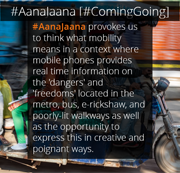Training: a brief note
Training: a brief note
Training is an important component of JAGORI’s work since its inception. It aims to build perspective on gender equality through dialogue on current and emerging issues within the women’s movement. It attempts to raises awareness around unaddressed questions affecting the lives of marginalized and oppressed groups, to sensitize on the systemic nature of violence against women and girls, their safety and rights. It offers an understanding of the intersections between patriarchal institutions including marriage, family, religion and State and its impact on the status of women. “Personal is Political” has been the operating principle of JAGORI in facilitating training. In other words, training at Jagori helps build capacities of participants to bring a feminist perspective into their lives and work.
Objectives:
Training at Jagori aims:
- To build conceptual clarity on gender, patriarchy and feminism
- To develop tools for critical understanding of development paradigms from a feminist perspective
- To share knowledge of the women’s movement: its inception, achievements, challenges and ongoing campaigns
- To build capacities to apply this understanding in their ongoing lives and work
Training areas: reaching different groups:
The journey of our training began with workshops on the conceptual understanding of gender, patriarchy & feminism. Gradually issues like violence against women, single women, mental and emotional health of women and alternative healing therapies through a feminist perspective were covered.
Jagori reaches out to women, youth and men of all ages through its annual Gender Course, thematic and advanced courses, short sessions and long term accompaniment. The programmes address NGO functionaries, social workers, grassroots leaders and gender trainers through its training programmes. Jagori has also conducted gender sensitization sessions and workshops with teachers and students of schools and colleges; government institutions; bilateral and donor agencies. It is linked with a network of gender activists and trainers that enable work with It also has a strong network at advocacy levels.
Use of resources: modification and creation of new modules and techniques:
The training team uses the vast pool of resources and training materials that have been built through JAGORI’s extensive work over more than 3 decades since 1984, at the same time it also creates new modules to reflect changing contexts and expectations. Training materials are used within the training space and also distributed as reading materials. Participants are added to Jagori’s mailing list so that they remain abreast of current debates on relevant issues in the country.
Methodology of Training:
Training programmes are conducted primarily in Hindi and English. Emphasis is placed on participatory learning, and the use of gender training tools, small group discussions, role plays, song, art, and narrative. Training is grounded in personal experience and reflection, and results in individuals seeing opportunities for themselves to change their own lives and the lives of others. Participants are encouraged to access support from the resource persons as they apply this learning.
Course content:
Modules are determined with a view to meeting the needs and expectation of the participants. Current debates and questions are included. Basic modules include:
- Concepts of gender, patriarchy and feminism
- Violence Against Women/ Laws related to Women
- Women and work, globalization
- Creating safer cities for women
- Sexuality
- Masculinity
- Women and governance






